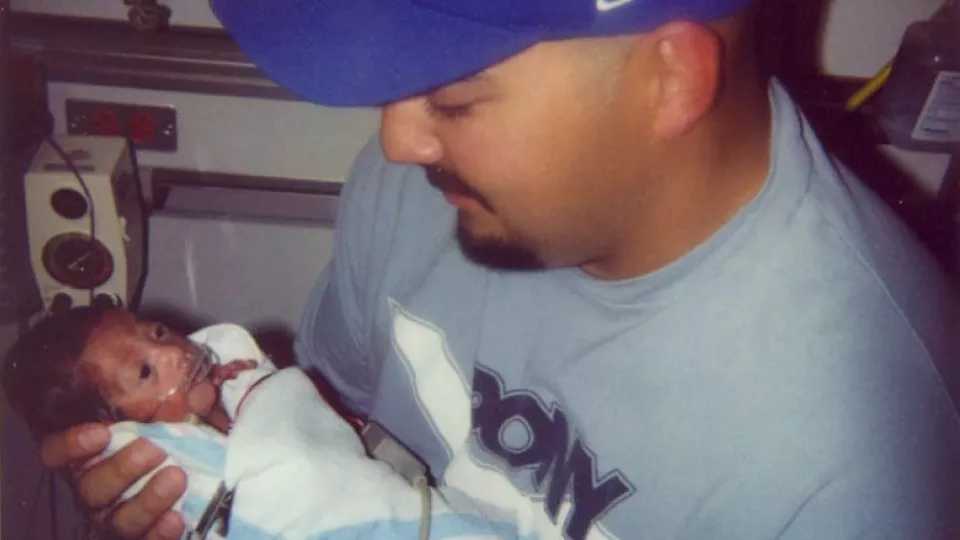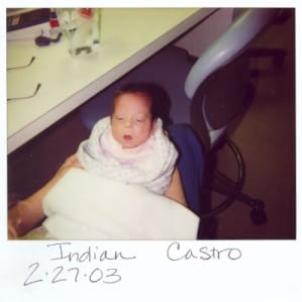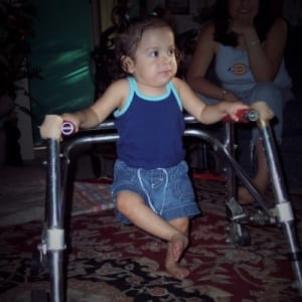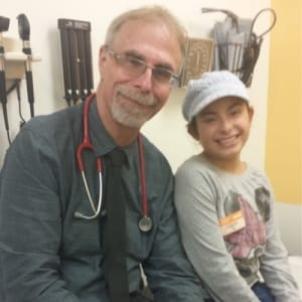
Reaching New Heights
Imagine a newborn so small you can hold her entire body in one hand. Then imagine the overwhelming concern and responsibility you would feel for her fragile life if this were your own child. For Nicole and Danny Castro, it doesn’t take any imagination; their daughter, Indi, born at just 26 weeks gestation, was so tiny that her dad could slip his wedding ring all the way up her arm.
While pregnant with Indi, Nicole was in a car accident that caused her to go into pre-term labor. The Castros, who live in Bakersfield, California, were insured through a managed health plan, and Indi spent her first three months in their local hospital’s neonatal intensive care unit. She had her first surgery at just 17 days old to repair a congenital heart defect called patent ductus arteriosus (PDA), which was straining her heart by allowing blood to flow from the aorta into her pulmonary artery and lungs. Eventually strong enough to go home, Indi continued to see multiple specialists, including an endocrinologist.

“We knew we were facing a lot of health challenges with her,” says Nicole, “but many of her diagnoses didn’t come for a long time.”
When Indi was 15 months old, Danny’s employer changed health insurance plans, which meant the Castros had to find new specialists for their daughter’s care. They asked her former endocrinologist for a recommendation, and he enthusiastically referred them to a former colleague: Mitchell Geffner, MD, at Children’s Hospital Los Angeles.
“From the beginning, Dr. Geffner was extremely open and caring and really made us feel at ease,” Nicole says. “With everything we had gone through, and as first-time parents, we had really no idea what we were doing. The guidance we received from Dr. G was lifesaving.”
A few months into his treatment of Indi, when she was 18 months old and all of 20 pounds, Geffner diagnosed her with growth hormone deficiency (GHD) and diabetes insipidus. Unlike the more common diabetes mellitus, which relates to the level of glucose in the blood, diabetes insipidus relates to the level of water in the blood and sodium levels in the body. In addition to these complex conditions, Indi was diagnosed with cerebral palsy by Robert Kay, MD, vice chief of the Children’s Orthopaedic Center at CHLA.
“We really didn’t know what the ramifications of those diagnoses would be on her long-term health,” says Nicole, “but we felt like Dr. G took us under his wing. He educated us. He’s very empathetic and he truly made us feel like we weren’t alone in the decisions we had to make.”
When Indi was first diagnosed with GHD, she had to undergo a test that Nicole describes as “pretty intense.” In preparation for the test, a staff member took Indi’s weight. Geffner had left the room briefly, and as soon as he came back and saw the number he said, “No, this is not right.” It turned out they had weighed Indi with her diaper on. She was placed back on the scale without the excess weight, and only then did Geffner begin the test.
“He’s that attentive every single time,” Nicole says. “When she’s being measured, he knows if something’s not right and he’ll say, ‘Let’s measure again.’ Now before every appointment, we know the rule: Don’t put Indi’s hair up in a bun because Dr. G will make her take it out!”

The Castros have had a long time to get to know their beloved “Dr. G.” Once a teeny preemie, Indi is now a strong, confident and busy 14-year-old. She eagerly talks about her activities and interests, including drawing, swimming, baking and playing trombone in the school band. Now in 8th grade, Indi is involved in an enrichment program called “Project Lead the Way,” in which she is learning about crime scene investigation and anatomy. With so much going on, Indi still achieved straight As last quarter.
“I like when Dr. G asks me about school,” Indi says. “He asks me about my grades and he says he’s proud of me. And he says, ‘It’s amazing how you remember all the medicines you have to take. I can always count on you if your parents don’t remember.’”
Due to cerebral palsy, the front tendon on Indi’s right leg is longer than the back tendon, and she cannot straighten her leg completely. In August 2016, she had surgery to treat this condition and she now adeptly gets around with just the help of a brace. “If I’m diligent in stretching it and walking a lot, it should grow out in one to two years,” Indi says with excitement.
While she has never met anyone else with diabetes insipidus, there are a couple other kids at school with cerebral palsy. “There is one girl about my age in another class,” Indi says. “Last year, she was in a wheelchair, barely walking around. And this year, she is walking on her own! She doesn’t have the wheelchair, just a brace like me. I told her it was really cool how she did that.”
It’s no wonder Nicole calls her daughter one of the strongest people she’s ever met, with an “old soul quality and an open-mindedness and acceptance of her condition.” Nicole and Danny credit Geffner for much of their daughter’s confidence and courage.
“Dr. G always educates her and makes sure she’s a part of everything,” Nicole says. “When he goes over her records and reviews her growth from one appointment to the next, we are all included so we all understand. We always tell her she doesn’t have to be her only advocate, but she does have to be her own advocate.”
Indi’s diabetes insipidus is controlled well with medication, so the primary focus of Geffner’s endocrine treatment for Indi is to help her get as close to her genetically predisposed height as possible before her bones mature and she stops growing.

Indi has been receiving growth hormone injections since she was 18 months old, and until recently, she also got Lupron shots to block the production of estrogen, which can cause early bone growth and skeletal maturation. Now that she is 14, Indi no longer takes the estrogen blocker but continues to take growth hormone and sees Geffner at CHLA every few months.
“Dr. G wants me to get to five feet and I’m about 4-feet- 9-inches tall now,” Indi explains. “My bone age is 12 ½, and by the time I get to 13, my bones will start to solidify and it will be harder for me to grow. That’s why I take the growth hormone shot every night.”
Through the years, Indi and her family have forged a lifelong bond with Geffner. “We put our whole lives in his hands,” says Nicole, “and we have always felt like it was a personal investment for him.”
Nicole remembers asking Geffner when Indi was about 4 years old, “What will happen if she doesn’t get her specific medications for diabetes insipidus?” He thoughtfully and honestly responded that Indi could face dire consequences. It was a life or death situation.
“He really has had to counsel us and discuss the hard issues. But he never scolds. We make mistakes but we are so blessed to have had him since Indi was 15 months old,” says Nicole. “We—and I mean CHLA and the whole community—are blessed to have Dr. G.”


